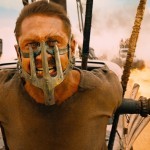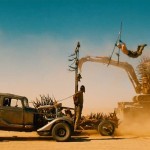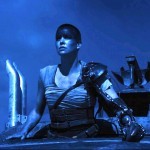Adrian Tchaikovsky's Blog, page 10
May 30, 2015
Children of Time vignette 3: Home Fires
He was a hunter in a harsh season. His name was Rom.
His people lived in the lowlands, near the sea, but the fishing had been poor this year, poorer than the last. The fish were so few, and many of them caught deformed. A strong man could live on fish alone and not get sick, but not the children, not women heavy with child, not the old. So Rom had set out to his old hunting grounds to trap and kill the beasts his forefathers had left him.
Last year he had been everyone’s favourite. He had come home with four sticks strung with rats and squirrels and rabbits. This year the cold had come early – the first snows seemed only a moon after midsummer, and he could count the days he had seen the sun on his fingers and toes. Today, the sky was closed with white cloud, and sky-dust was blowing on a wind that tasted sour and salt on his tongue.
This year he had set his traps but the beasts did not come. The cold had driven them further afield, or else they remembered Rom and his snares, and their dead relatives, and avoided him.
He knew the legends: how great magicians of an elder age had raised up the beasts and given them thought and speech, and how that had angered God, who had brought the winter to make an end of all the sinners in the world.
Rom wondered sometimes if he was a sinner, and how many sinners were left, for the winters were no less fierce than in his childhood. If anything they were worse.
Rom could not know that the pale masses of dust which still clogged the upper air had thrown back so much of the sun’s heat that his world was gripped between two hands of ice, north and south. Every summer they relaxed their grip, those hands, but each winter those fingers stretched out, further than the year before. All Rom knew was that the winters grew worse by little increments, and the hunting sparser, and life grew harder.
He had been forced to go further afield, each day’s travel a burden on him as the way back lengthened. Now he had come uphill to the broken stone land in the hope that the shelter of the place would have brought in perhaps cats or foxes or even swine, big game to make the journey worthwhile.
But the snows were closing on him, numbing his fingers and nose and ears even though he wrapped his cloaks about him, each one a patchwork of tiny pelts.
The broken stone land was ahead of him, as far as the snow let him see: some great towers still stood, reaching high enough to prop the clouds up. Many more had fallen, making the place a maze of shattered stone. There were riches there, they said, but it was haunted by terrible spirits and there were other tribes, too, jealous of what they had. And surely, if that was the case, the hunting would be no better there. But Rom was desperate.
He had heard that a great guardian had once stood before the Stone Place, warding off any who sought to claim its riches. Now he saw the truth of it, though she had fallen long before, her gigantic stone body strewn in sections down the slope from the broken stump of her feet. She had stood tall and robed and crowned, said the stories, and he believed them, seeing her now. She had held one hand high, bearing a sword to smite those who might trespass in the broken stone land.
Rom’s feet dragged: he could not feel them through the chill. Even his own weariness was just a distant drumbeat, slower and slower. If he did not find shelter soon, he would be simply one more hunter who walked out into the world and never returned, and his people would speak his name a few more times, and forget him.
The furthest-flung pieces of the guardian were ahead of him, stone wreckage looming high, half-smothered with snow. He could see the wind-shadow they cast, though, and forced his senseless legs onwards, step after step, even as the gusts blew fiercer and swifter, a blizzard building in the eternally white sky.
He saw the outflung arm, now in pieces but still reaching out towards him. She had been bearing something aloft, but amongst the fragments of her splendour he saw no shattered sword blade or spear haft. Whatever it was she had been holding, he could not make it out.
As his stumbling progress brought him closer, his mind drifted. He saw her, in his head: a beautiful tall woman standing defiantly, daring any to challenge her. In his mind she was not placed to warn away travellers, but to challenge the winter itself: standing firm against the wind and snow, and in her hand, a flame.
He collapsed at last, but he was in the shadow of the stone. With clumsy, unfeeling hands he got out his sticks and tinder, and lit his fragile fire in the shelter of a broken stone torch.
Share this
May 29, 2015
Children of Time vignette 2: The Last Martian
Here is the second little slice of time. As you can probably guess, you shouldn't get too attached to any of these characters…
One hundred and four days.
Jenniver Amartez was impressed, in a way. None of it was supposed to last this long, not in these conditions. But it had struggled gamely on and there had come a point, around the sixty day mark, when she had thought they had wrought better than anyone had anticipated, and it would last.
By seventy-five days that illusion was gone. The living systems were too complex to find equilibrium, the environment too hostile to give them the time. Everything had begun to die.
The main colony domes werelong dead by then. By the time she had been able to jury-rig a receiver, the only signals she could pick up were automated warnings, and precious few of those. Pretty much everything had been knocked out.
She didn’t want to think about how many Martians there had been, before the virus pulse from Earth. Thousands, certainly. Men and women and children whose parents and grandparents had been Martians. People whose ancestors had come here when the planet truly was a freezing hell, instead of just a steadily deteriorating purgatory. They had lived in domes and they had worked on the atmosphere – painstakingly transforming it into something that was a slower death for humans, and that could just about sustain other life, with help.
She had not appreciated, until the pulse, just how much help.
Jenniver Alvarez walked through the dying forests of Mars.
Trees stood in tall rows – not really trees, not really like anything that had evolved on earth, but bioengineered life designed to suck in carbon and push out oxygen. The orderly ranks of them ran as far as the eye could see, and the ground around them was carpeted with a man-made moss/fungus symbiote. All artificial, just like everything on Marsexcept the rocks and the ice and the thin carbon dioxide atmosphere that was gradually re-establishing its hold on the planet.
A fourth-generation Martian, she had given her life to Mars. Not long ago she had been able to walk in the plantation without a suit, with only a portable air supply to tipple from, like a hip flask. The biomass around her had pumped out heat and oxygen in such concentrations that she could stand beneath the Martian sky and let the faraway sun fall directly on her skin. She had looked forward to her children or her grandchildren running free and swift in the low gravity, barefoot masters of a world made home by the hand of humanity.
Now she wore a suit for, as the artificial atmosphere around her dissipated, the heat given out by the plants was sucked away. Now she carried her air with her.
Some part of Mars had been green, for a brief moment: a generation in individual human terms, an eyeblink in the history of the species. Now it was brown again as the plantations withered and died around her.
Everything had been so carefully maintained by the computers. The entire colonised area of Mars had been a colossal cybernetic system managed by artificial brains able to tweak every little detail. The vast plantations were maintained by an irrigation network, constantly fed exactly the required balance of nutrients and chemicals to help them conquer the red planet’s ire. When the pulse came, transmitted on multiple frequencies from Earth, travelling at light speed without any warning, every system on Mars had gone down, hopelessly riddled with a virulent artificial plague.
She had been keeping track of the war, of course. There had even been fighting on Mars, though not so very much. Everyone had followed the reports, hoping that someone would win quickly enough that a normal service would be resumed. If not for the NUNs, probably it would have been. But one side in the war had yoked its fortunes to the popular groundswell worked up by the anti-transhumanists, and then they found they were the tail trying to wag the dog. They found you can’t just put crazy like that back into the bottle. Every time someone came to the peace table there was another attack, an assassination, something to fan the flames. On Mars, the colonists had listened to the reports grow graver and graver, until there were no more reports and the only comms they could intercept were military. They were still listening intently when the virus pulse came through.
They had all died, the people in the domes. The computers had been keeping them alive. But Jenniver, out here alone in the agricultural station, she had lived. Here, within the planet’s dying lungs, the work of human hands had persisted for a few more tens of days.
She passed one of the robot workers, little more than a wasted weight of metal. Everything had gone down. She didn’t want to think of the outer colonies, those fragile little bubbles on the gas giant moons or the mining bases in the asteroid belt. The pulse would have reached them all, and further and further, radiating outwards towards the stars.
Not long now.
Jenniver Amartez stood amidst the dying Martian forests and looked out into the dark sky, seeking the dust-shrouded, silent dot that was Earth.
Share this
May 28, 2015
Children of Time — vignette 1: For Love of Humanity
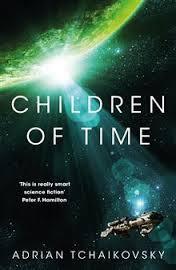 Children of Time hits the shelves on 4th June, or may indeed already be sneakily sitting there in a bookshop near you (you should go out and check, right now!). In the run up to C-Day I'm going to take you on a journey from the world of tomorrow all the way to the distant, broken future where most of the book takes place: six slices of frozen time to bridge that gap. From a police interview room to a frozen world, from a derelict space station to the depths of interstellar space, here are the building blocks that make up the backstory of Children of Time. I should post up one a day for the next few days. Enjoy!
Children of Time hits the shelves on 4th June, or may indeed already be sneakily sitting there in a bookshop near you (you should go out and check, right now!). In the run up to C-Day I'm going to take you on a journey from the world of tomorrow all the way to the distant, broken future where most of the book takes place: six slices of frozen time to bridge that gap. From a police interview room to a frozen world, from a derelict space station to the depths of interstellar space, here are the building blocks that make up the backstory of Children of Time. I should post up one a day for the next few days. Enjoy!For Love of Humanity
“So, four years, you worked there.” Detective Mekkino Andersfal shook his head. “I get the impression this wasn’t just your way of saying you were owed a raise.”
Njall Toren stared straight ahead, no eye contact. “I don’t know what you’re talking about,” he stated.
“They treat you badly, Njall?” Mekkino pressed, pacing behind the man. His partner, Ubbi, sat across the metal table from Toren, one eye closed, the other – the glass one – looking like it was peering into the man’s soul. As it might well be. They’d cautioned Toren about the recording, but how was he to know, really, when the recorder was inside a man’s skull?
“I don’t know what you’re talking about,” Njall repeated.
Mekkino stopped behind the man’s chair and checked his tablet. Ubbi’s implant was keeping tabs on heart-rate, pupil dilation, microexpressions. A whole lot of tech to tell Mekkino what he knew already.
“All the cameras, the door locks, all the electronics at the auditorium, they went sky high, of course,” he said, pacing again. He liked to be expansive when he had a suspect bang to rights. “But you were a clever little terrorist, so you made sure you covered your tracks, changed the records so that it looked like you were never anywhere near. But maybe you weren’t so clever, because our tech boys found where you meddled. They say you covering your tracks left your fingerprints all over the system.” Obediently, Ubbi fed the latest forensics summary over, but Mekkino was on a roll and didn’t need it.
“I don’t know-“ Njall started, and the detective grabbed his chair and hauled it back, leaving the man bent over backwards, staring upside-down into Mekkino’s face. And, of course police department chairs weren’t supposed to tilt like that, but an hour with a toolbox and a little ingenuity worked wonders.
“You know how many people were in there when your little toy went off, Njall?” he yelled into the prisoner’s face. “Of course you do! Four hundred and seven delegates, the best and the brightest, science ministers from across Europe, two Nobel Prize winners, not to mention three whole departments-worth of Reykjavik’s academic finest. They’ll be scraping IQ points off the walls for months.”
Ubbi coughed flatly, a sign that Mekkino was getting carried away. Ubbi did not hold with theatrics.
“Four hundred and seven people, and the whole world up in arms,” Mekkino spat, and slammed the chair forwards fast enough that Njall’s forehead bounced off the table.
“Not people,” the prisoner spat.
Ubbi’s organic eye opened, met Mekkino’s gaze, then closed again.
“Would you care to elaborate on that?”
Njall twisted round in the chair, pulling his restraints taut against the table. “You’re not one of them,” he got out. A line of blood was trickling down his forehead, which Mekkino was already writing up as ‘self-inflicted’. Ubbi’s headware recordings were malleable things.
“Who aren’t I one of, Njall?” he asked conversationally.
“You’re human, a real person. I can tell,” Njall insisted.
“How kind.”
“Not like him.” Njall bared his teeth at Ubbi’s overlarge glass eye, at the man’s slightly misshapen head where the implant rested beneath the skin.
A signal on the tablet: He must be NUN. We should send for the specialist task force.
Mekkino shook his head slightly. “People are people, Mr Toren.”
“You think that’s what they think?” Njall’s eyes were wide, spit flecking his lips. “Detective, you don’t get it. You know what they were doing in there? You know what I had to stop? They were stealing our future!”
“Right, well, unlucky for you we’re homicide, not theft.”
“Detective, there were people in there who make machines that think like people – but a thousand times faster. There were people who make talking abominations out of animals. There were people who weren’t human any more – they’d given themselves over to the machines. They don’t care about us, about the real humans. They’re making themselves faster, smarter than us. And one day they’ll come for us.”
“Is that right?” The rhetoric was depressingly familiar. Only last month that Thai bioengineer had been shot dead leaving his home, and then there was that singer, the one with the silver skin, who was stabbed… The anti-transhumanists were springing up all over the globe, children of fear and ignorance, fundamentalists, fanatics… except everyone said there were plenty of people in power who were quietly backing them, because when you were already at the top, sometimes you didn’t want the world changing too fast.
“They say they’re building a better future,” Njall was gabbling, “but it’s not for us. It’s not for anything you’d recognise as human. You know – the, the terraformers, the planets they’re working on?”
Mekkino nodded, already trying to word his report.
“You think those worlds are ours? For us to live on? No! That’s for them, for their filthy experiments, for their hybrid abortions, their talking dogs and their computer gods! Our future, our inheritance, and they’re taking it away, detective! They’re taking it away from us! Non Ultra Natura, detective! No more than nature intended!”
“Speaking of taking people away.” Mekkino nodded to Ubbi, who signalled the officers outside. Time to hand Toren over to the Anti-NUN boys.
Njall’s rant stopped dead when the door opened and he looked from Mekkino to Ubbi with real agony in his eyes. “You can’t side with them forever,” he whispered. “They’ll overwrite you, they’ll dispossess your children. You have family, Detective?”
“None of your business.”
“What jobs will there be for them, when there are men like him who can do more?” Njall demanded, and then, just as Mekkino thought he was going off the deep end again, “When the next promotion comes round, why would they give it to you? You’re not a superman with a computer brain. How do you compete, Detective? How do any of us compete?”
The officers dragged him out, though he seemed quiet, now, almost defeated. Mekkino was left with Ubbi, trying to meet his human gaze but unable to avoid staring at his all-seeing glass eye.
***
The next morning the task force arrived, but Njall Toren was gone. Station records showed a transfer, but nothing matched up and the records had been hacked. Someone had come and taken him in the small hours.
“Friends in high places,” Ubbi speculated. “They always said the NUNs had connections, that it wasn’t just a cult of crazies.”
“You think they spirited him off to safety?”
The cyborg detective shrugged lopsidedly. “I think he knew things they didn’t want us finding out. Why, what were you thinking?”
“Maybe it was revenge. Maybe your people got to him first.”
Ubbi went still, looking at his partner with his head slightly tilted. “Would you care,” he said slowly, “to elaborate on that.”
“I’m sorry. I don’t mean…” But Mekkino’s words stuttered to silence in the face of that artificial gaze, that saw right through him and measured his every thought and fear.
Share this
May 17, 2015
Mad For Max
Mad Max: Fury Road is hands down my favourite film so far this year, and it's set a high bar to get over for the remaining six months. I have a somewhat odd record with the previous 3 films — the original film didn't interest me all that much — it lacks the gonzo post-apocalypse elements of the later ones, and violent action on its own, however well presented, doesn't push my buttons that much. Road Warrior I enjoyed far more, which sets the tone and the aesthetic for the series, but my guilty secret is that Thunderdome — the one most people say is the worst — has always been my favourite. Yes, it has less cars and less action, but at the same time I really like the whole Thunderdome society, and the community of children at the plane crash is marvellously realised — a really nice piece of SF in a way that Chris Beckett would follow on with his award-winner Dark Eden (not that Beckett's necessarily riffing on MM3, but the idea of a mythology arising out of children's half-understandings is clear in both).
Fury Road is the best yet, taking what worked from the previous movies and adding in a whole extra nitro-injection of additional thought and insanity. In my humble opinion, here's what's so great, about the film and the franchise as a whole. Spoilers below, I'm sure, but I really, really, encourage you to go watch the film anyway, if you haven't already.
From Road Warrior this has been a real strength of the franchise. It may seem a weird thing to single out about a series of films that are basically a lot of cars on fire covered in spikes being riddled with bullets. Mad Max films almost never stop to explain anything (save maybe in Thunderdome), and the world presented to the viewer is madder than Max is: Humungus's motorised army, the pig-powered Thunderdome, the warlords of Fury Road, it all just explodes onto the screen and then doesn't stop running, demanding that we keep up, It's all spikes and deformities and insane customs, cruelty and mad, mad ways of life that couldn't possibly last another generation. But that's the point: it's the end of the world. We're being shown the last diseased flowers of human society now the oil, the water, the everything has run out. Most films offer a thin thread of hope for the future, but on all sides it's threatened by the madness of human nature backed into a corner. And there's a hell of a lot of detail making up the craziness. George Miller doesn't need to stop and tell us what's going on because the people we see, their broken culture and their ways, it all convinces the moment it hits the eye — there's always enough context that any 'Why is…?; questions are answered. Personal favourite tiny detail: that bridle Max is wearing while he's strapped to the front of the car — have a look at it. That's mostly made from the head of a garden fork; you can even see the hole where it would have been attached to the handle.
2. Characters
Another great strength of the MM films has been creating enormously idiosyncratic characters with just a few quick brush strokes — not only big roles like the gyro captain/aviator (Bruce Spence's magnificent defining role), Aunty from Thunderdome; the valiant Angharad or the hapless Warboy Nux from Fury Road, but everyone, every role is full of personality and character — you have an immediate sense of how they fit into Max's mad world without anyone needing to talk the viewer through it. With both character and world, Miller and the various teams he has worked with are really giving a masterclass on how to bring their films alive, layering detail on detail to create briefly glimpsed vistas that convince the viewer of a wider setting, and a wider history that brought everything to that state.
3. Max is mad
Just a small note for Fury Road but, yeah, Max is far more pointedly mad this time, suffering from serious PTSD because of all the terrible things he's seen, and because of the people he couldn't save. He starts off little more than an animal: almost wordless save for demands about the trappings taken away from him, fixated solely on his own survival. Furiosa's quest gives him a reason to come back to his humanity, but he's a genuinely traumatised person who has great difficulty relating to other human beings.
Probably a very personal point but — well, I listen to a lot of music written for film trailers. For writing action scenes, it's second to none — most pieces are basically two minutes of 100% adrenaline. That's not to say the MM4 soundtrack is just that, but there are some cracking tracks on it. I also really enjoyed the way the composer, Tom Holkenborg, meshed the incidental music with the drumming/electric guitar from Immortan Joe's musicwagon so seamlessly. So, yes, no serious critical point here except that I went out and bought the soundtrack as soon as I got home after watching the film.
5. Action
Apparently around 80% of the effects shots in Fury Road (and all of the shots in the previous films for obvious reasons) were physical effects — actual cars, actual explosions, actual stunts, and it shows. Those scenes that do rely heavily on CGI come over as a bit ropy in comparison, but it is incredibly refreshing to get that much reality in a film like this. Cracked.com has an article here that talks about why CGI often fails to convince, and if you have a film with a visual aesthetic as outright lunatic as Mad Max, grounding it with physical effects is a good move. More than that, Miller is an artist of the chase scene and the action shot — there's no cheating, none of the quick cuts, the inconsistent positioning — everything is there, everything keeps continuity. People do absurdly dangerous things, and that danger is actively sold to us, rather than brushed under the carpet.
6. Charlize Theron
Tom Hardy makes a good Max. Theron gives us the sort of female action lead we haven't really seen since Ellen Ripley. Imperator Furiosa is a fully-rounded action hero who does everything an action hero needs to do. She drives the plot, and the main character arc is hers, for all her story allows Max to find something to fight for. Like Ripley, what Furiosa does doesn't overtly demand a female character — she's not female so she can fall in love with Max, for example — and like Ripley the film cuts her no slack whatsoever, beats on her unmercifully and does its level best to kill her at every opportunity. Theron is splendid, both on her own and working with Hardy and the rest of the cast.
Not an actual elephant — it's just about the only piece of spectacle the film doesn't have. The elephant in the exploding spiky room, however. You've probably heard that there's been some controversy about Mad Max not being a "Man's film" and conning men by concealing feminist rhetoric under its explosions. Or something. Is there anything to this? Well… look: the plot is about the rescue of a warlord's wives (his 'property' as he shouts) by a female road warrior; there are a large number of female characters who are treated with the same brutally demanding hand by their world and by the action as the male. Is this some attack on masculinity? No. The film is very happy to let any character step up to the hero plate — the wives, the Many Mothers, Max or even Nicholas Hoult's intensely likeable Nux. Nux, of course, is as much a victim of the Warboy society as everyone else — a living illustration of Laurie Penny's point in her Unspeakable Things that a patriarchal society doesn't run itself for the benefit of men, but for that of patriarchs like Joe. Fury Road is a glorious, fast-moving, explosive example of why diversity improves a film.
All pictures taken from IO9 — mostly their superb review here — as I assume these are publicity shots for general free use. Please let me know if not via Twitter @aptshadow.
Share this
May 1, 2015
Arthur's 'Alf Dozen 2015 edition
Or maybe 2014, as that's the year under the microscope. The shortlist has been out a while, the ceremony is Wednesday 6th May, so there's just time for me to vent my minuscule opinions on the subject before the rather better informed panel of judges proves me wrong. So… in name order:
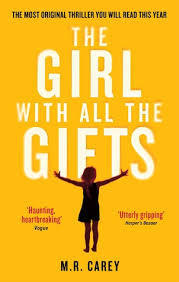 The Girl with all the Gifts by Mike Carey (Orbit)
The Girl with all the Gifts by Mike Carey (Orbit)
Synopsis: in the future, zombies. The setting kicks off as an intentionally straight zombie apocalypse, and a team of scientists and military trying to discover why some child victims of the fungal vector retain their intellect, whilst also inheriting the zombies’ uncontrollable hunger. Things go downhill…
My take: I kind of avoided this book for a long time. I really don’t like zombies because they've become such a tired and hackneyed concept. For that reason I am enormously indebted to the Clarkes judges because this is a fantastic book. It’s billed as a thriller, and I read it every spare moment I had because the suspense and pace make it enormously addictive, but it’s also fascinating SF, a new take on an old apocalypse, and we see most of the action from the point of view of one of the child-zombies, a character who is at once deeply sympathetic and terribly, terribly creepy. Of the six, this was the most compelling reading experience (insert own "when it gets its teeth into you" joke here). It just doesn't let up, and there's no spare fat at all in it.
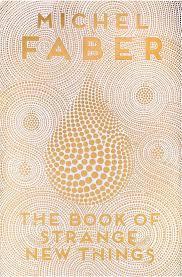 The Book of Strange New Things by Michel Faber (Canongate)
The Book of Strange New Things by Michel Faber (Canongate)
Synopsis: As this world slides into gradual chaos and disintegration, Peter leaves his wife Bea for the distant planet of Oasis, to serve as missionary to the humanoid natives. On arrival he discovers that far from facing the hostile reception he was anticipating, the locals are bizarrely desperate for the word of God.
My take: Missionaries in space is a subject SF has touched on before, but Faber’s slant on it is very different, and impossible to go into much without spoiling the denouement. This is a book that lives entirely in Peter’s head. He is a devout, earnest, genuinely well intentioned man, and he strives in a very human way to deal with his separation from his wife (from whose increasingly anxious communications we learn about how things are going to pot back home) and with the unexpected and unnerving welcome he receives from the natives. The emphasis is very much on his journey, on faith and in human nature, but the planet of Oasis is intriguing physically as well as metaphorically. There are a lot of contrasts and games going on between order and chaos, passion and calm, both inner and outer, and the endgame is thought-provoking. This book looks at the outset as though the SF is going to be perfunctory and not thought through, made subordinate to the philosophy (why are the humans giving medicine to the natives when they have no idea about the alien biology?) but in fact there are answers to be found, and they're interesting and satisfactory ones. The book works well on all levels.
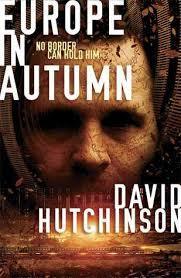 Europe in Autumn by Dave Hutchinson (Solaris)
Europe in Autumn by Dave Hutchinson (Solaris)
Synopsis: In the near future, Europe is fragmenting into ever smaller statelets and polities as regional separatism runs mad. In a world of borders and red tape, those who can travel freely can name their own price. Rudi goes from being a chef in Poland to becoming one of a shadowy organisation of couriers who travel the compartmentalised landscape of Europe with impunity. But with great freedom comes great enemies…
My take: I’ve written about this one here. This is the only entry I’d read before the shortlist was announced, and I loved it. There isn’t much (English language anyway) SF set in mainland Europe, and the bureaucratic balkanisation of Hutchinson’s future is endlessly plausible. The book is full of little living details of life in future Europe, and there’s also a Mystery to be unravelled as the plot deepens. Europe has been on more than one shortlist this year, and deservedly so. It’s a perfect balance of action and ideas. I’ve already praised it in past blog posts, but I can’t stress enough just how much I enjoyed this book. Hutchinson captures the idealism and the pettiness of nations and of people perfectly, and of all the protagonists on this list, I think I liked travelling with Rudi the most. (1)
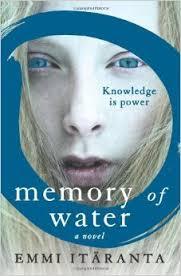 Memory of Water by Emmi Itäranta (Harper Voyager)
Memory of Water by Emmi Itäranta (Harper Voyager)
Synopsis: in a climate-racked future where the seas have risen but fresh water is vanishingly scarce, Noria is a tea master in Chinese-occupied Scandinavia, a trade that requires both large quantities of water and a perfect understanding of it. Her family’s dark secret is the hidden spring that allows them to continue their traditions, but the military is hunting water criminals…
My take: This is a very slow, careful, meticulous and thoughtful book. The future presented is believable, grim (with one potential ray of hope) and all the more real because it is happening to everyday people. The tea ceremony and the characteristics of water pervade the text at every level. Not the easiest read of the six by any means, but definitely one that stayed with me for a long time. Itäranta fuses style, setting and subject matter perfectly — water and flow are everything, in presence and absence. A very elegant, beautiful book, and perhaps the most wholly persuasive of the various fallen futures on display: not with a bang, but a parched whisper.
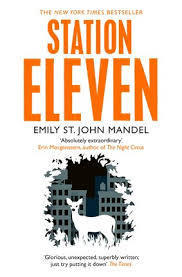 Station Eleven by Emily St John Mandel (Picador)
Station Eleven by Emily St John Mandel (Picador)
Synopsis: Arthur Leander, screen idol turned stage idol, dies in harness playing Lear. Even as he does, a catastrophic plague is just starting its journey through the world, wiping out most of the human population. Decades later, a band of players and musicians travels from town to town through a slowly rebuilding landscape.
My take: Station Eleven is a series of character studies more than a story in and of itself – the main two are Arthur, dead before the end of the world, and Kirsten who was a child actress in Lear, and carried the memory of the production into her later career as post-apocalypse Shakepearean. A variety of other viewpoint characters – pre– and post-plague – are presented, all of whom were touched somehow by Arthur’s work and life, and many of whom were touched by the obscure comic book Station Eleven, a story of a more fantastical dystopic future. Mandel writes beautifully, and her characters spring to life in their vignettes. Station Eleven has had a colossal critical success, and I can absolutely understand why, but… of all the shortlist, this was the one I didn’t quite get on with. It’s not a book that’s telling a story – there is a plot, but it is minimalist, and the SFnal elements are very much in the background. I enjoyed reading the various sections of the book but, as a purely personal reaction, I was waiting for it to lead me somewhere and it never quite did.
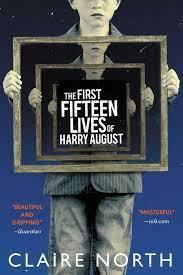 The First Fifteen Lives of Harry August by Claire North (Orbit)
The First Fifteen Lives of Harry August by Claire North (Orbit)
Synopsis: Crikey, where to start? Harry is a Kalchakra. Every time he dies he’s reincarnated. As himself, at the same time and place as his original birth. There is a whole society of Kalchakras spread across time living repeated, overlapping lives in a history that shifts and changes as they alter it. They try not to alter it, because if someone from 1900 sets in motion serious changes then those down the timestream will be faced with an unrecognisable world when they are reborn – if they are reborn at all. And now word is being passed back down through history through those overlapping lives that the end of the world is getting closer each time round.
My take: I don’t usually remember my dreams, but I dreamt about the world of this book while I was reading it, as my brain tried to process how it all worked. Mind. Blown. frankly. The whole setup with the Kalchakra is a stroke of genius on the part of North, and while we never find out why it happens, the book explores the implications of this peculiar arrangement very cleverly as Harry tries, life after life, to find out which of his peers is destroying the world. It’s kind of an espionage novel, but the lens of the Kalchakra means everything works differently to the norm – think of Blofeldt telling James Bond his plan, and then killing Bond – only when Bond is reborn back in the early 20th century he comes into being with that knowledge and can use it – paradox free – to stop Blofeldt. Or kill Blofeld before he gets into long trousers. Except what if Blofeld is also a Kalchakra… This is a must read book, win or lose, because the concept is so bizarre and so well executed.
So there we have Arthur’s ‘Alf Dozen 2015, and it’s an interesting split. August, Girl and Europe are books where the idea is expressed primarily through the onwards motion of the story, whereas to varying degrees Water, Station and Book are more retiring, drawn more by character than circumstance – which is not to say any of them are lacking in either dimension, but the split in emphasis did seem to fall straight down the middle between those sets. I don’t envy the judges, and although I personally didn’t quite click with the Mandel, they’re all worthy contenders. If I were on the board, I suspect I’d be arguing for Europe or August to take the crown, Europe because of the intriguing and very different setting, August because my brain has still not straightened out after reading it.
(1) Trying to get a cover image by way of careless searching on Google did result in my being bombarded with pictures of, well, Europe, in Autumn.
Share this
April 22, 2015
The Life of a Writer
One of the many things I am not is a webcomic artist. However, this was not always the case. My past has murkier things in it than you can possibly imagine. I once ran a strip for the BBC Berkshire website, and I have cartooned for Mongoose publishing (kind of briefly) and a few other sites (with a fantasy strip called Big Stick that had nothing to do with Order of…). I did rather let the side down all round, partly by doing it all for free and mostly by not being very good. However, I still keep my hand it, insofar as I ever had a hand, and when I'm too busy for a proper post I will stick a pic up occasionally, just for the whatthehell of it. So here you go.
Share this
April 10, 2015
The Axeman Cometh
Did I do that joke last year? There are a limited number of axe-related puns in the world, honestly.
Anyway, it's that time of year (a bit later than the same time last year, if that makes any sense at all) when someone has to get axed. The Gemmell Awards have opened up for voting on the longlists, and you can find the page here. The voting tab is on the topbar, and as usual anyone at all can cast a stone for their favourite in three categories — the Legend award for best book, the Morningstar award for best newcomer, and the Ravenheart award for best cover art. It would be profoundly dishonest of me not to mutter under my breath that Seal of the Worm is on the Legend list, but seriously, no Sad Spider Slate here. There are a lot of absolutely cracking books on the list, so vote with your conscience (1). Do go vote, though. It may be the most open-voted award in the genre with the least faff involved in voting. I think voting closes some time in May, so the window isn't huge, and the actual awards are being announced and delivered (not, one hopes, Druss-like and blade first) at hotly anticipated Nine Worlds 2015 in August. So, you know, perfect for post-award commiseration and drinks…
(1) and when the Spider Invasion happens I promise that there will be absolutely no post-hoc arachnid scrutiny of voting records…
Share this
April 8, 2015
After the Omelette
Eastersprosiumcon was a great fun weekend, albeit somewhat expensive when you tot everything up (1). Caught up with all the great and the good (or the scum and the villainy) that constitute the con-going author and publishing bods. My panel items all went well — we had a YA panel with the unusual benefit of having an actual YA reader on it (thank you Emjay Ameringen!), a decent Holmes Panel (Thanks in particular to both panellist Linda Stratmann (the best qualified of all of us) and Gary Stratmann who agreed to moderate at 5 minutes' notice), plus a nice Gemmell slot in the Newcon room that was well received. I particularly enjoyed the Cryptids panel, where Seanan McGuire and I mostly enthused about octopi at each other.
As for watching, the Newcon Press mini-programme was very good all round. Gillian Redfearn, Peter Newman, Aliette de Bodard and Gareth Powell chatted on how to build an agent trap. Jo Thomas and Fran Terminiello did a particularly nice talk/demo on fencing for writers (highly recommended if they do it again at a con you're at), and I caught some very high class readings from Ed Cox and Al Robertson. I also gatecrashed an official Gollancz game of Cards against Humanity.
BSFA awards went to Edward James (non-fiction — genre writers and WWI), Tessa Farmer (art — the phenomenal Wasp Factory physical art piece (2)), Ruth Booth (short fiction — Honey Trap from Newcon's Femme antho) and Anne Leckie (Ancilliary Sword). My personal twitch would have been towards Hutchinson's Europe in Autumn or Hardinge's Cuckoo Song, but it was an extremely strong field.
Speaking of which, the Arthur C Clarke shortlist is out (3) and I'm going to try and get the whole list read before the actual awards like last year. The list can be found here. I've read the Hutchinson already, of course, and the North and the Mantell were at the top of my to-be-read pile (4) already, so it's a fairly organic process. More when I've mulched my way through them.
(1) I bought a metric crapton of books.
(2) I have no words to describe this wonderful thing.
(3) Shortly after the abovementioned metric crapton, meaning that I now have batch of books to buy.
(4) Pile/several shelves
Share this
After the Omlette
Eastersprosiumcon was a great fun weekend, albeit somewhat expensive when you tot everything up (1). Caught up with all the great and the good (or the scum and the villainy) that constitute the con-going author and publishing bods. My panel items all went well — we had a YA panel with the unusual benefit of having an actual YA reader on it (thank you Emjay Ameringen!), a decent Holmes Panel (Thanks in particular to both panellist Linda Stratmann (the best qualified of all of us) and Gary Stratmann who agreed to moderate at 5 minutes' notice), plus a nice Gemmell slot in the Newcon room that was well received. I particularly enjoyed the Cryptids panel, where Seanan McGuire and I mostly enthused about octopi at each other.
As for watching, the Newcon Press mini-programme was very good all round. Gillian Redfearn, Peter Newman, Aliette de Bodard and Gareth Powell chatted on how to build an agent trap. Jo Thomas and Fran Terminiello did a particularly nice talk/demo on fencing for writers (highly recommended if they do it again at a con you're at), and I caught some very high class readings from Ed Cox and Al Robertson. I also gatecrashed an official Gollancz game of Cards against Humanity.
BSFA awards went to Edward James (non-fiction — genre writers and WWI), Tessa Farmer (art — the phenomenal Wasp Factory physical art piece (2)), Ruth Booth (short fiction — Honey Trap from Newcon's Femme antho) and Anne Leckie (Ancilliary Sword). My personal twitch would have been towards Hutchinson's Europe in Autumn or Hardinge's Cuckoo Song, but it was an extremely strong field.
Speaking of which, the Arthur C Clarke shortlist is out (3) and I'm going to try and get the whole list read before the actual awards like last year. The list can be found here. I've read the Hutchinson already, of course, and the North and the Mantell were at the top of my to-be-read pile (4) already, so it's a fairly organic process. More when I've mulched my way through them.
(1) I bought a metric crapton of books.
(2) I have no words to describe this wonderful thing.
(3) Shortly after the abovementioned metric crapton, meaning that I now have batch of books to buy.
(4) Pile/several shelves
Share this
March 31, 2015
The Dysprosium Egg (1)
Firstly, and before everything gets transmuted to Dysprosium (2), I had an awesome time at Luxcon. I got to pal around the Peadar O Guilin and Aliette de Bodard — both authors whose work I tremendously admire. I got to play in a zombie survival game — as myself — run by local GM Ben, and I and the other guests got enormously well looked-after. I also got to make the acquaintance of the awesome Miltos Yerolemou, Syrio Forel from Game of Thrones, who gave a fantastic interview where he talked about his work on GoT and absolutely refused to talk about his work on the new Star Wars movie (because my man Miltos knows about non-disclosure agreements  )
)
Barely time to catch my breath before Dysprosium, aka Eastercon. We are the Egg Men.
What I Am Doing At Eastersprosium.
Friday 17.30 — Panel: Cryptids — a Modern Bestiary, with Seanan McGuire, Peter Harrow and Tom Lloyd
Friday 18.45 — Panel: YA Fiction– a Maturing Readership — something of a late entry ergo I'm not actually named on the current programme for it. With Peadar O Guilin, Emjay Ameringen and, I think, Frances Hardinge
Sunday 11.15 Panel: Holmes — with Linda Stratmann and Sam Stone.
Sunday 15.00 Panel: Writing David Gemmell — with Ed Cox, Gaie Sebold, Freda Warrington and Ian Whates. Note this is off-piste as part of the Newcon Press programming in room 15 — see p29 (currently) in the programme for the Newcon stuff — there are some particularly good panels hiding away in their list.
Also I will be part of a general signing at 16.15 on Saturday so if you have something for me to sign, preferably a lucrative film deal, come on over.
(1) That's, er, lovely, Harry, but why don't we go back to "The Stainless Steel Rat" for now.
(2) Voted "Element that most sounds as though you're talking about a disease when you start to say it" three years running.
Share this

